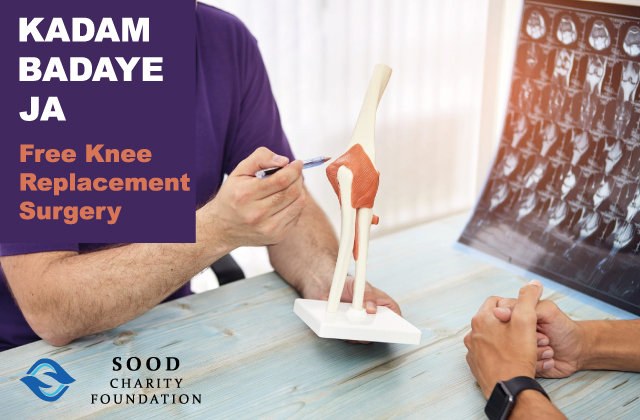
Kadam Badaye Ja: Sood Charity Foundation Provides Free Knee Replacement Surgery
What is Knee Replacement Surgery?
Knee replacement surgery is a common surgical procedure that is done to relieve pain and disability resulting from damaged or advanced degeneration of the knee joint. Replacement of knee involves the replacement of the damaged or worn-out parts of the knee joint with artificial prostheses, which are designed to mimic the movement of a healthy knee joint.
The most common condition that leads to surgical replacement of knee is Osteoarthritis, a degenerative joint disease that affects the cartilage that cushions the ends of the bones. Osteoarthritis causes the cartilage in the knee joint to wear away, leading to bone-on-bone contact, which can cause pain and limited mobility. Other conditions that may lead to knee replacement surgery include rheumatoid arthritis, post-traumatic arthritis, and avascular necrosis.
Complete recovery and rehabilitation post knee replacement surgery can take several weeks or months. Physical therapy is an important part of the recovery process, as it helps to regain strength and range of motion in the knee. Most patients are able to walk with crutches or a walker within a few days of the surgery, and are able to return to many of their normal activities within 2-6 weeks.
What are the signs of needing a knee replacement surgery?
1. Persistent pain: Severe pain in the knee that interferes with daily activities and is not relieved by rest, over-the-counter pain medications, or other non-surgical treatments.
2. Limited mobility: Difficulty walking or climbing stairs, or difficulty getting in and out of chairs or into and out of a car.
3. Stiffness: A feeling of stiffness or a limited range of motion in the knee, making it difficult to bend or straighten the leg.
4. Bone-on-bone contact: A grinding or crunching sound or sensation in the knee when moving it, which may be indicative of bone-on-bone contact in the knee joint due to worn-out cartilage.
5. Deformity: Bowing or buckling of the knee, which may indicate advanced arthritis or a knee injury.
What is the best age to have a knee replacement?
The best age to have knee replacement surgery determined on an individual basis after a consultation by an orthopedic surgeon. In general, knee replacement surgery is usually recommended for patients who have severe pain and limited mobility due to knee arthritis or other degenerative conditions. This stage is observed for patients above 55 years of age.The surgery is not usually recommended for younger patients unless their pain and disability are severe and other treatments have been ineffective.
Replacement of knee is considered when a patient’s knee arthritis has reached a level of pain and disability that interferes with the ability to perform the activities of daily living and failure of conservative treatment approaches. The surgery is not delayed too much because the patient also needs to have physical and mental capacity to comply with the post-surgery rehabilitation program.
Advantages and Disadvantages Of Knee Replacement Surgery
Advantages:
- Pain relief: Knee replacement surgery can provide significant relief from pain caused by knee arthritis or other degenerative conditions. This improves the patient’s quality of life.
- Improved mobility: After knee replacement surgery, patients typically experience improved range of motion and flexibility in their knee, which can make it easier to walk and move around.
- Increased activity level: With less pain and improved mobility, patients can often return to many of their normal activities after knee replacement surgery, such as walking, climbing stairs, and even running.
- Long-lasting results: Knee replacement prostheses have a very good lifespan and can last for several years and up to even decades in some cases.
Disadvantages:
- Surgery and recovery time: Knee replacement surgery is a major procedure that requires a significant recovery period.
- Risk of complications: As with any surgery, there is a risk of complications, such as infection, blood clots, and stiffness in the knee.
- Risk of prosthesis loosening or failure: Knee replacement prostheses can become loose over time, which can cause pain and instability. Eventually a revision surgery may be needed if prostheses fail.
Dangers of delaying knee replacement surgery
1. Increased pain and disability: As knee arthritis or other degenerative conditions progress, the pain and disability they cause can become increasingly severe. Delaying surgery can lead to more advanced arthritis, which can make the surgery more complex and increase the risk of complications.
2. Loss of function: As knee arthritis progresses, the joint can become increasingly stiff and difficult to move. Delaying surgery can lead to further loss of range of motion and muscle strength, making it harder to regain function after the surgery.
3. Increased risk of falls: Severe knee arthritis can make it difficult to walk and maintain balance, increasing the risk of falls and related injuries. Delaying surgery can lead to a greater risk of falls and injuries.
4. Reduced quality of life: Living with severe knee pain and limited mobility can greatly impact a patient’s quality of life, leading to depression and social isolation. Delaying surgery can lead to a longer period of time spent living with pain and disability.
5. Dependence on others: Delaying knee replacement surgery can limit one’s ability to care for oneself, leading to dependence on others for basic activities of daily living, such as bathing, dressing and grocery shopping.
Kadam Badaye Ja
Kadam Badaye Ja is an initiative by the Sood Charity Foundation, a non-profit organization that provides free knee replacement surgery to those who cannot afford it.The foundation partners with hospitals and surgeons to provide free knee replacement surgeries to patients who meet certain financial and medical criteria. Free knee implants of the best quality are used to give a new lease of life to people suffering from the agony of severe knee pain. All the surgeries take place in Mumbai, Maharashtra.
Be a good samaritan and donate to our cause, Kadam Badaye Ja.
Jai Hind.


No Comments